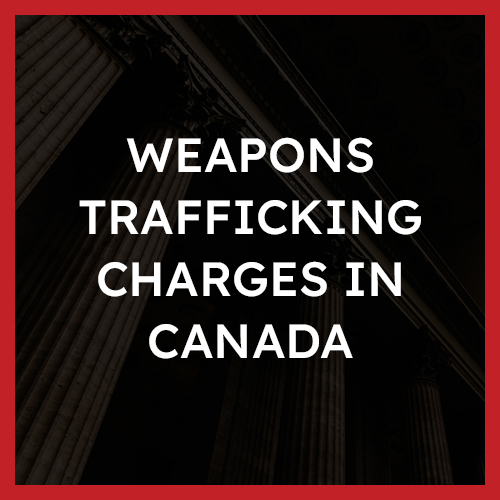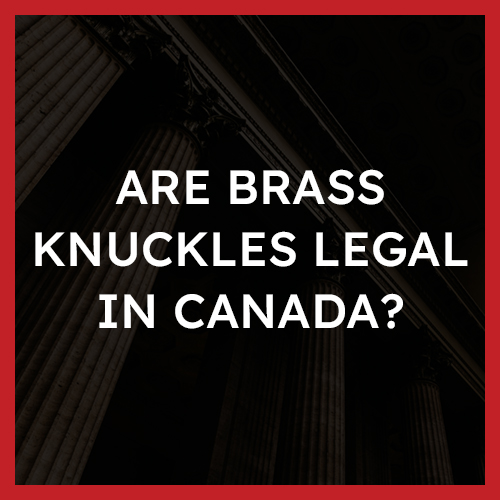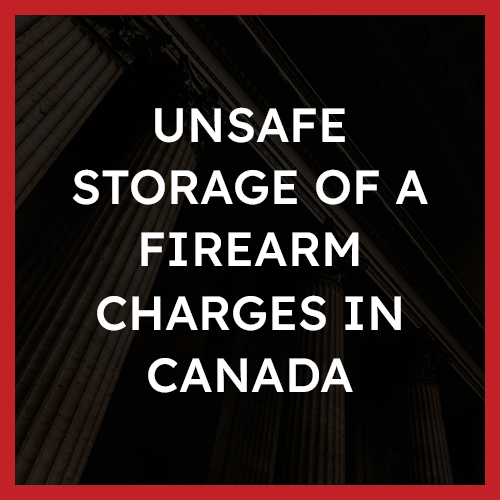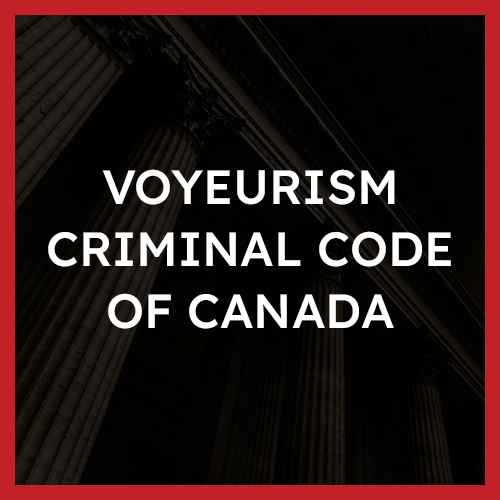Weapons Trafficking Laws in Canada

Section 99(1) sets out the offence as involving a person manufacturing, transferring, or offering to manufacture or transfer one of the following: a prohibited firearm, a restricted firearm, a non-restricted firearm, a prohibited weapon, a restricted weapon, a prohibited device, any ammunition or any prohibited ammunition. This offence is classified as indictable.
Examples of Weapons Trafficking
Some examples of a weapons trafficking charge may include the following:
- A person manufacturers an AK-47;
- A person transfers a restricted firearm; or
- A person offers to manufacture ammunition.
Defences for Weapons Trafficking
The defences available for a weapons trafficking charge are entirely dependent on the facts of your case.
However, some defences to a weapons trafficking charge may include:
- The accused was wrongly identified;
- The accused was under duress;
- The accused’s Charter rights were violated; or
- Firearms were not involved.
Punishments for Weapons Trafficking
A weapons trafficking charge is an indictable offence which entails a maximum punishment as follows:
- Imprisonment for a term not exceeding 14 years.
Section 99(2) of the Criminal Code outlines mandatory minimum punishments for this offence. In the case of a first offence, the mandatory punishment is 3 years imprisonment. For the second or subsequent offence, the mandatory punishment is 5 years imprisonment.
A break and enter to steal firearms charge can also entail severe consequences for current and future employment opportunities and immigration status.
Overview of the Offence
(2) Every person who commits an offence under subsection (1) when the object in question is a prohibited firearm, a restricted firearm, a non-restricted firearm, a prohibited device, any ammunition or any prohibited ammunition is guilty of an indictable offence and liable to imprisonment for a term not exceeding 14 years and to a minimum punishment of imprisonment for a term of
(a) in the case of a first offence, three years; and
(b) in the case of a second or subsequent offence, five years.
This section references 99(1), which reads:
99 (1) Every person commits an offence who
(a) manufactures or transfers, whether or not for consideration, or
(b) offers to do anything referred to in paragraph (a) in respect of
a prohibited firearm, a restricted firearm, a non-restricted firearm, a prohibited weapon, a restricted weapon, a prohibited device, any ammunition or any prohibited ammunition knowing that the person is not authorized to do so under the Firearms Act or any other Act of Parliament or any regulations made under any Act of Parliament.
The Guilty Act (Actus Reus)
The actus reus for a weapons trafficking charge under s.99(2) is established by proof, beyond a reasonable doubt, of the following:
- The accused manufactures or transfers a thing;
- The thing is “a prohibited firearm, a restricted firearm, a non-restricted firearm, a prohibited weapon, a restricted weapon, a prohibited device, any ammunition or any prohibited ammunition”
OR
- The accused offers to manufacture or transfer a thing
- The thing is “a prohibited firearm, a restricted firearm, a non-restricted firearm, a prohibited weapon, a restricted weapon, a prohibited device, any ammunition or any prohibited ammunition”
The Guilty Mind (Mens Rea)
The mens rea for a weapons trafficking charge includes proving, beyond a reasonable doubt, that:
- The accused knew they were not authorized to manufacture or transfer the firearms or ammunition.
Defences
How to Beat a Weapons Trafficking Charge?
Every case is different. The availability and strength of any defence depend entirely on the specific facts of your case. The strength of any available defence rests on the evidence against you and the precise details of the allegations. However, the following are some common defences that may be used when fighting a weapons trafficking charge.
Identity
Depending on the circumstances of your case, a possible defence to a weapons trafficking charge may be to raise an identity defence. In this case, for this defence to be raised successfully, you will have to prove that you were not the person who engaged in trafficking the weapons.
Duress
Another possible defence for weapons trafficking is duress. Duress exists where the accused is subject to a threat of death or serious injury and reasonably believes that this threat could be carried out. Further, there must be no saft avenue for the accused to escape, and a close temporal connection between the harm and the crime. Proportionality between the threat and offence also is examined on a modified objective standard where both objective and subjective factors are considered. Lastly, the accused must not be a party to the conspiracy. If you can make out these elements, the duress defence may apply. Cases such as R v De Vos have attempted to apply this standard.
Knowledge
The mens rea for this offence is that the accused did not know they could not transfer the firearms. If you can prove that you believed you had permission to manufacture or transfer firearms, the mens rea element of this offence may be unable to be met.
No Firearms
As this offence specifically refers to trafficking firearms or ammunition, it must be proven that these items were items being trafficked. If this does not occur, an essential element of the offence will not be made out.
Any Applicable Charter Defences
The Charter sets out your rights and freedoms before and after your arrest. If the police fail to abide by these rights deliberately or inadvertently, it could aid in your defence. If any of your Charter rights have been violated before or after your arrest, you may be able to have some or all of the evidence that the Crown is relying on to secure a conviction excluded under s. 24(2) of the Charter. R v Grant is an example if a case in which the accused’s section 9 and 10 Charter rights were violated, resulting in the acquittal on a weapons trafficking charge.
Punishments
The Criminal Code provides for a possible maximum term of imprisonment of no more than 14 years for those convicted of a weapons trafficking charge. The Criminal Code also outlines mandatory minimum sentences for this offence, which first offenders having a mandatory minimum sentence of three years, and second or subsequent offenders having a mandatory minimum sentence of five years.
Persons found guilty of weapons trafficking are eligible for sentencing entailing a discharge, suspended sentence, stand-alone fine, custody, custody with a fine or probation or a conditional sentence order.
Frequently Asked Questions
Can you go to jail for weapons trafficking?
If you are found guilty of weapons trafficking, you will go to jail. This is an indictable offence with the maximum sentence being life imprisonment.
What is the maximum penalty for weapons trafficking?
The maximum penalty for a break and enter to steal firearms charge is 14 years imprisonment. This is an indictable charge with the maximum sentence outlined in the Criminal Code. Mandatory minimum penalties are also outlined in the Code. First offenders will face imprisonment for a minimum term of 3 years, while second and subsequent offenders will face a jail term of five years.
Is weapons trafficking an indictable offence?
Weapons trafficking is an indictable offence. This means that the Crown cannot choose to proceed summarily, or by indictment. When proceeding by indictment, a weapons trafficking charge carries a maximum sentence of 14 years imprisonment.
Published Decisions
R v Grant, 2009 SCC 32
Grant is a Charter case related to weapons trafficking. The accused was stopped by two undercover officers, who believed he was acting suspiciously. After a brief interaction, they identified themselves and searched him, finding a gun. They did not read the accused his Charter rights. The Supreme Court found that his right against unreasonable search and seizure and to obtain a lawyer was violated.
You can read the full decision here.
R v Burke, 2014 ONSC 3199
Burke stands for the proposition that the act of trafficking can be made out by an offer along regardless of actual intention to sell or give the thing offered. The accused was arrested back in intercepted communications obtained via authorized wiretap.
R v De Vos, 2018 ONSC 2674
In this case, the accused had a Firearms Possessions and Acquisition License which allowed him to purchase restricted and non-restructed firearms. The accused argued that he was threatened into selling his guns to a friend. Though the elements of duress were not made out, this case shows that the defence could be raised successfully in the future.
You can read the full decision here.
Contact Us
If you have been charged with a criminal offence, visit our location pages to contact our team.
About The Author
Ask A Question
We endeavor to respond to questions within 24 hours. If your matter is urgent, please call our office or submit a request for a free consultation.







